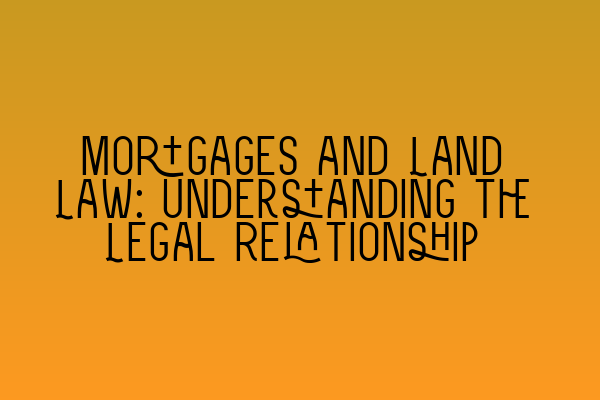Mortgages and Land Law: Understanding the Legal Relationship
Welcome to another informative blog post from SQE Property Law & Land Law. Today, we will be delving into the intricacies of mortgages and land law, providing you with a comprehensive understanding of the legal relationship between these two areas.
A mortgage is a legal agreement between a lender and a borrower, where the borrower uses their property as collateral to secure a loan. This loan is then repaid over a specified period of time, including interest, until the debt is fully settled. In the event of default, the lender has the right to repossess the property and sell it to recover their money.
Now, let’s dive deeper into the legal aspects of mortgages and land law.
1. Types of Mortgages
There are several types of mortgages that you need to be aware of. These include:
– Fixed-rate mortgages: This type of mortgage has a consistent interest rate throughout the term, offering stability to borrowers.
– Variable-rate mortgages: The interest rate on this type of mortgage can fluctuate based on changes in the market.
– Interest-only mortgages: With this type of mortgage, the borrower only pays the interest on the loan for a set period, after which they start repaying the principal amount.
– Buy-to-let mortgages: These mortgages are specifically designed for individuals who want to purchase a property to let out to tenants.
2. Legal Process of Obtaining a Mortgage
When obtaining a mortgage, there are several legal steps that need to be followed. These include:
– Mortgage application: The borrower must provide necessary documents and information to the lender for assessment.
– Property valuation: The lender will conduct a valuation of the property to determine its worth and suitability as collateral.
– Mortgage offer: If the lender is satisfied with the borrower’s application and valuation, they will issue a mortgage offer.
– Conveyancing: The borrower will need to appoint a solicitor or conveyancer to handle the legal aspects of the mortgage, such as preparing the mortgage deed and registering it with the Land Registry.
3. Legal Rights and Responsibilities
Both the borrower and the lender have certain legal rights and responsibilities in a mortgage agreement. These include:
– The borrower’s responsibilities: The borrower is responsible for making regular repayments, maintaining the property, and insuring it.
– The borrower’s rights: The borrower has the right to use and occupy the property during the term of the mortgage, as long as they meet their obligations.
– The lender’s responsibilities: The lender is responsible for ensuring that the terms of the mortgage agreement are adhered to and that the borrower is treated fairly.
– The lender’s rights: The lender has the right to repossess the property if the borrower defaults on their repayments, and to sell it to recover their money.
4. Land Law Considerations
Mortgages are tightly intertwined with land law, as the property serves as collateral. It is crucial to understand the legal considerations related to land law, such as:
– Property ownership: Understanding who owns the property and any legal restrictions or encumbrances is essential.
– Land registration: The property must be registered with the Land Registry to establish legal ownership and protect against potential claims.
– Easements and covenants: These are legal rights and obligations that affect the use and enjoyment of the property, and they can impact the mortgage agreement.
In conclusion, mortgages and land law are inseparable when it comes to property transactions. By understanding the legal relationship between these two areas, you can navigate the mortgage process with confidence, ensuring that you comply with legal obligations and protect your rights as a borrower or lender.
For further preparation on your SQE exams, be sure to check out our related articles:
– SQE 1 Practice Exam Questions
– SQE 1 Practice Mocks FLK1 FLK2
– SQE 2 Preparation Courses
– SQE 1 Preparation Courses
– SRA SQE Exam Dates
Remember, at SQE Property Law & Land Law, we are here to support you in your journey towards becoming a qualified solicitor. Stay tuned for more valuable insights in our upcoming blog posts!
Disclaimer: This blog post is intended for informational purposes only and should not be construed as legal advice. Please consult with a qualified solicitor for personalized guidance on your specific situation.
